Bhopal to Host 21st World Rose Convention 2028
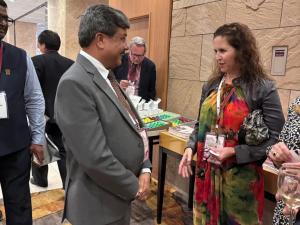
Mr. Sheo Shekhar Shukla, IAS, Principal Secretary – Tourism & Culture, Government of Madhya Pradesh, engaging with international delegates at the World Rose Convention 2025
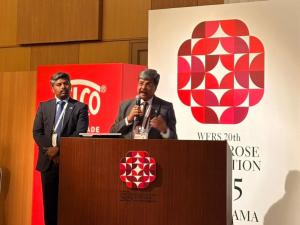
Mr. Sheo Shekhar Shukla, IAS, Principal Secretary – Tourism & Culture, Government of Madhya Pradesh, addressing global delegates at the World Rose Convention 2025 in Fukuyama, Japan
Madhya Pradesh Tourism receives official handover in Fukuyama, Japan, marking India’s debut as host of the prestigious global event
BHOPAL, MADHYA PRADESH, INDIA, May 26, 2025 /EINPresswire.com/ -- Madhya Pradesh has proudly received the official handover to host the 21st edition of the prestigious World Rose Convention in 2028, as announced at the closing ceremony of the 20th World Rose Convention in Fukuyama, Japan. This marks the first time India will host the global gathering of rose enthusiasts, horticulturists, and researchers, with Bhopal selected as the host city.At the handover ceremony, Mr. Sheo Shekhar Shukla, IAS, Principal Secretary Tourism and Culture and Managing Director of Madhya Pradesh Tourism Board, received the ceremonial flag from the World Federation of Rose Societies (WFRS), symbolising the official transition of hosting duties to India. He was joined by Mr. Vivek Jude, Deputy Director, Events and Marketing, MPTB, and Mr. Mahendra Pratap Singh from Travel India Tours, as part of the official Indian delegation.
Also representing India was a 14-member delegation from the Madhya Pradesh Rose Society, whose active participation and presence further strengthened India’s commitment to global floriculture and the upcoming convention.
Adding to the occasion, Mr. Sushil Prakash of the Madhya Pradesh Rose Society was elected President of the World Federation of Rose Societies — the first Indian to hold this honour further underscoring India’s growing presence in the global floriculture space.
The convention in Japan welcomed over 500 delegates from countries including Australia, Japan, Finland, the United Kingdom, South Korea, and several parts of Europe. The Indian delegation left a lasting impression through vibrant presentations and cultural showcases, highlighting Madhya Pradesh’s tourism potential, natural beauty, and vision for sustainable growth.
Speaking at the event, Mr Sheo Shekhar Shukla said:
“It is a matter of immense pride for us to be given the honour of hosting the 21st World Rose Convention in the heart of India – Incredible Madhya Pradesh. The state is globally recognised for its rich cultural heritage, monuments, and natural beauty. We warmly welcome rose enthusiasts and guests from across the world to the Heart of India.”
Bhopal, with its scenic lakes, green spaces, and blooming gardens, promises to offer a vibrant and immersive experience in 2028. Plans for the convention include thematic rose gardens, technical sessions, cultural performances, and tourism showcases across Madhya Pradesh all designed to offer a uniquely Indian experience with global appeal.
The Governor of Madhya Pradesh, Mr. Mangubhai Patel, serves as the Chief Patron of the Madhya Pradesh Rose Society, supporting the state’s growing role in international horticulture.
About the World Rose Convention
Organised every three years by the World Federation of Rose Societies, the World Rose Convention is one of the world’s most significant horticultural events. The 20th edition, held from May 18 to 24, 2025, in Fukuyama, Japan, featured expert lectures, exhibitions, and sessions on rose cultivation, garden innovation, and environmental sustainability.
As India prepares to welcome the world in 2028, Madhya Pradesh invites global delegates to experience its rich culture, blossoming landscapes, and signature hospitality in Bhopal.
CR
Madhya Pradesh Tourism Board
email us here
Visit us on social media:
Instagram
YouTube
X
Legal Disclaimer:
EIN Presswire provides this news content "as is" without warranty of any kind. We do not accept any responsibility or liability for the accuracy, content, images, videos, licenses, completeness, legality, or reliability of the information contained in this article. If you have any complaints or copyright issues related to this article, kindly contact the author above.
Comfort Keepers of San Antonio Welcomes New Owners, Angie & Rod Zeck
Fortifi Capital Surpasses $175 Million in Small Business Funding as It Marks Two-Year Anniversary
Washington, D.C. Coach Brings Together Practical Strategy and Inner Work for Lasting Transformation
Więcej ważnych informacji
 Jedynka Newserii
Jedynka Newserii

 Jedynka Newserii
Jedynka Newserii

Ochrona środowiska

A. Bryłka (Konfederacja): Ograniczenie emisyjności nie musi się odbywać za pomocą celów klimatycznych. Są absurdalne, nierealne i niszczące europejską gospodarkę
W lipcu br. Komisja Europejska ogłosiła propozycję nowego celu klimatycznego, który zakłada ograniczenie emisji gazów cieplarnianych o 90 proc. do 2040 roku w porównaniu do stanu z 1990 roku. Został on zaproponowany bez zgody państw członkowskich, w przeciwieństwie do poprzednich celów na 2030 i 2050 rok. Polscy europarlamentarzyści uważają ochronę środowiska i zmiany w jej zakresie za potrzebne, jednak nie powinny się odbywać za pomocą nieosiągalnych celów klimatycznych.
Polityka
Dramatyczna sytuacja ludności w Strefie Gazy. Pilnie potrzebna dobrze zorganizowana pomoc humanitarna

Według danych organizacji Nutrition Cluster w Strefie Gazy w lipcu br. u prawie 12 tys. dzieci poniżej piątego roku życia stwierdzono ostre niedożywienie. To najwyższa miesięczna liczba odnotowana do tej pory. Mimo zniesienia całkowitej blokady Strefy Gazy sytuacja w dalszym ciągu jest dramatyczna, a z każdym dniem się pogarsza. Przedstawiciele Polskiej Akcji Humanitarnej uważają, że potrzebna jest natychmiastowa pomoc, która musi być dostosowana do aktualnych potrzeb poszkodowanych i wsparta przez stronę izraelską.
Polityka
Wśród Polaków rośnie zainteresowanie produktami emerytalnymi. Coraz chętniej wpłacają oszczędności na konta IKE i IKZE

Wzrosła liczba osób, które oszczędzają na cele emerytalne, jak również wartość zgromadzonych środków. Liczba uczestników systemu emerytalnego wyniosła w 2024 roku ponad 20,8 mln osób, a wartość aktywów – 307,5 mld zł – wynika z najnowszych danych Urzędu Komisji Nadzoru Finansowego (UKNF). Wyraźny wzrost odnotowano w przypadku rachunków IKE i IKZE, na których korzyść działają m.in. zachęty podatkowe. Wpłacane na nie oszczędności są inwestowane, a tym samym wspierają gospodarkę i mogą przynosić atrakcyjną stopę zwrotu.
Partner serwisu
Szkolenia

Akademia Newserii
Akademia Newserii to projekt, w ramach którego najlepsi polscy dziennikarze biznesowi, giełdowi oraz lifestylowi, a także szkoleniowcy z wieloletnim doświadczeniem dzielą się swoją wiedzą nt. pracy z mediami.
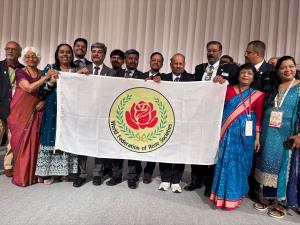
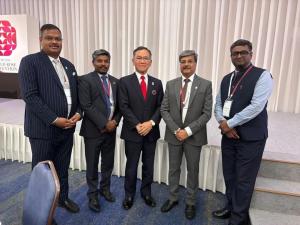
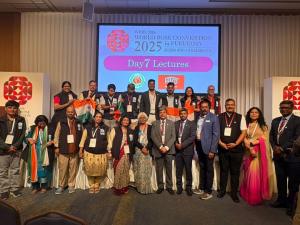







.gif)

 |
| |
| |
|